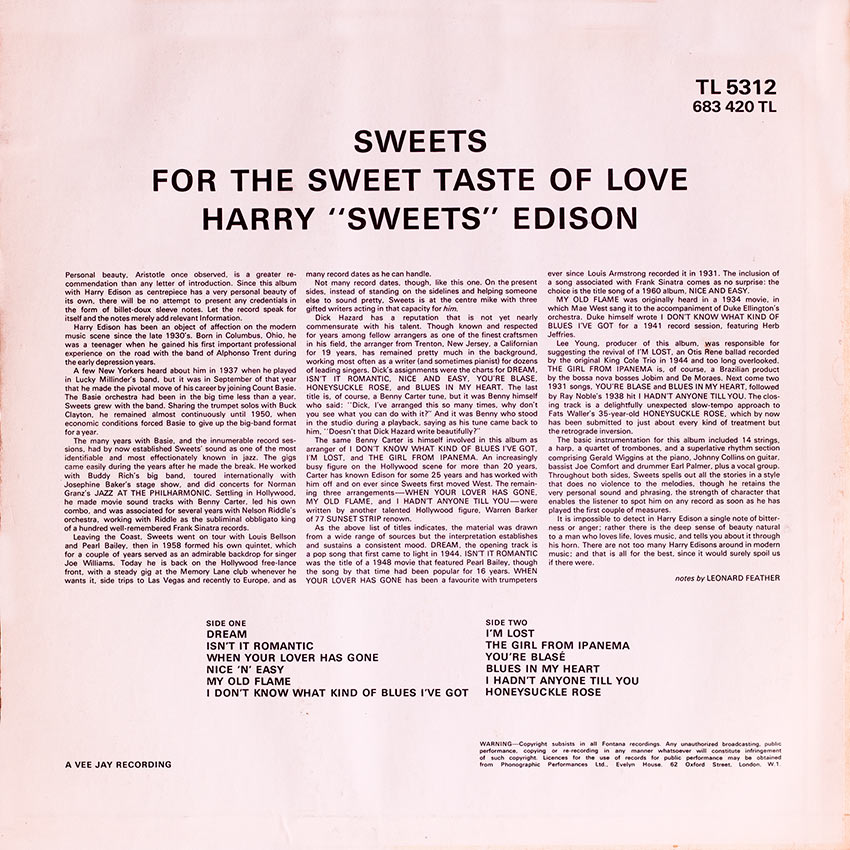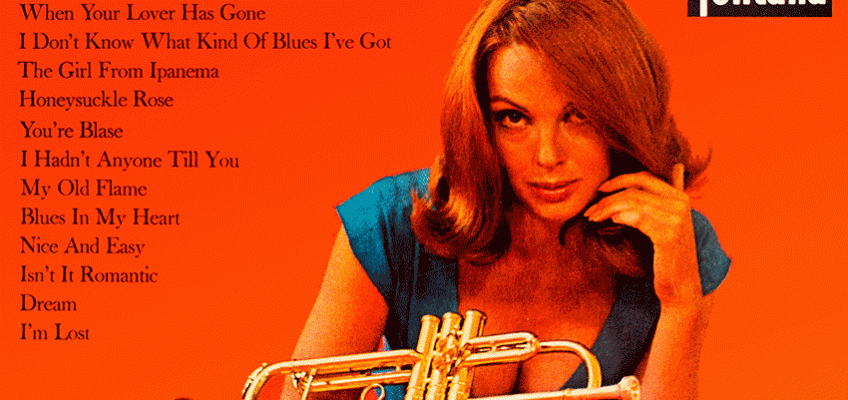Sleeve Notes:
Personal beauty. Aristotle once observed, is a greater re-commendation than any letter of introduction. Since this album with Harry Edison as centrepiece has a very personal beau, of its own, there will be no attempt to present any credentials in the form of billet-doux sleeve notes. Let the record speak for itself and the notes merely add relevant Information. Harry Edison has been an object of affection on the modern music scene since the late 1930’s. Born in Columbus. Ohio, he was a teenager when he gained his first important professional experience on the road with the band of Alphonso Trent during the early depression Years.
The many years with Basie, and the innumerable record sessions, had by now established Sweets’ sound as one of the most identifiable and most affectionately known in jazz. The gigs came easily during the years after he made the break. He worked with Buddy Rich’s big band, toured internationally with Josephine Baker’s stage show, and did concerts for Norman Granz’s JAZZ AT THE PHILHARMONIC. Settling in Hollywood, he made movie sound tracks with Benny Carter, led his own combo. and was associated for several years with Nelson Riddle’s orchestra, working with Riddle as the subliminal obbligato king of a hundred well-remembered Frank Sinatra records.
Leaving the Coast, Sweets went on tour with Louis Bellson and Pearl Bailey, then in 1958 formed his own quintet, which for a couple of years served as an admirable backdrop for singer Joe Williams. Today he is back on the Hollywood freelance front, with a steady gig at the Memory Lane club whenever he wants it, side trips to Las Vegas and recently to Europe. and as many record dates as he can handle.
Not many record dates, though, like this one. On the Present sides, instead of standing on the sidelines and helping someone else to sound pretty, Sweets is at the centre mike with three gifted writers acting in that capacity for him.
Dick Hazard has a reputation that is not yet nearly commensurate with his talent. Though known and respected for years among fellow arrangers as one of the finest craftsmen in his field, the arranger from Trenton, New Jersey, a Californian for 19 years, has remained pretty much in the background. working most often as a writer land sometimes pianist) for dozens of leading singers. Dick’s assignments were the charts for DREAM, ISN’T IT ROMANTIC, NICE AND EASY, YOU’RE BLASE, HONEYSUCKLE ROSE, and BLUES IN MY HEART. The last title is, of course, a Benny Carter tune, but it was Benny himself who said: “Dick. I’ve arranged this so many times, why don’t you see what you can do with it?” And it was Benny who stood in the studio during a playback, saying as his tune came back to him. “Doesn’t that Dick Hazard write beautifully?”
The same Benny Carter is himself involved in this album as arranger of I DON’T KNOW WHAT KIND OF BLUES I’VE GOT. I’M LOST, and THE GIRL FROM IPANEMA. An increasingly busy figure on the Hollywood scene for more than 20 years. Carter has known Edison for some 25 years and has worked with him off and on ever since Sweets first moved West. The remaining three arrangements – WHEN YOUR LOVER HAS GONE, MY OLD FLAME, and I HADN’T ANYONE TILL YOU – were written by another talented Hollywood figure. Warren Barker of 77 SUNSET STRIP renown.
As the above list of titles indicates, the material was drawn from a wide range of sources but the interpretation establishes and sustains a consistent mood. DREAM, the opening track is a pop song that first came to light in 1944. ISN’T IT ROMANTIC was the title of a 1948 movie that featured Pearl Bailey, though the song by that time had been popular for 16 years. WHEN YOUR LOVER HAS GONE has been a favourite with trumpeters ever since Louis Armstrong recorded it in 1931. The inclusion of a song associated with Frank Sinatra comes as no surprise: the choice is the title song of a 1960 album, NICE AND EASY.
MY OLD FLAME was originally heard in a 1934 movie, in which Mae West sang it to the accompaniment of Duke Ellington’s orchestra. Duke himself wrote I DON’T KNOW WHAT KIND OF BLUES I’VE GOT for a 1941 record session, featuring Herb Jeffries.
Lee Young, producer of this album, was responsible for suggesting the revival of I’M LOST. an Otis Rene ballad recorded by the original King Cole Trio in 1944 and too long overlooked. THE GIRL FROM IPANEMA is, of course, a Brazilian product by the bossa nova bosses Jobim and De Moraes. Next come two 1931 songs, YOU’RE BLASE and BLUES IN MY HEART, followed by Ray Noble’s 1938 hit I HADN’T ANYONE TILL YOU. The closing track is a delightfully unexpected slow-tempo approach to Fats Waller’s 35-year-old HONEYSUCKLE ROSE. which by now has been submitted to just about every kind of treatment but the retrograde inversion.
The basic instrumentation for this album included 14 strings, a harp, a quartet of trombones, and a superlative rhythm section comprising Gerald Wiggins at the piano. Johnny Collins on guitar. bassist Joe Comfort and drummer Earl Palmer, plus a vocal group. Throughout both sides, Sweets spells out all the stories in a style that does no violence to the melodies, though he retains the very personal sound and phrasing, the strength of character that enables the listener to spot him on any record as soon as he has played the first couple of measures.
It is impossible to detect in Harry Edison a single note of bitterness or anger: rather there is the deep sense of beauty natural to a man who loves life, loves music, and tells you about it through his horn. There are not too many Harry Edisons around in modern music: and that is all for the best, since it would surely spoil us if there were.
notes by LEONARD FEATHER

Label: Fontana TL 5312

